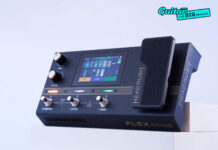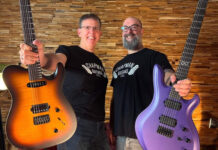
52 quick tips from guitar all-stars
No matter where we are in our playing lives, every guitar player wants to get that little bit better. So here, we present some collected words of wisdom from the rockstars who are out there on stage every night in front of hundred, thousands or even tens of thousands of fans. Whether it’s cleaning up your technique, sharpening up your soloing, writing better songs or improving your feel, these insider tips from the great and good of the guitar world will help make you a better player – and who knows, may set you on the way to your own rock ’n’ roll stardom…
Get yourself a decent guitar – Steve Vai
Image Credit: Getty Images“You can get a great instrument cheap these days. You want to have something that will be able to stay in tune and have good intonation. The neck should be able to set the action as a low as possible without any buzzing, so it should have a decent and straight neck on it. Perhaps of greatest value is how the guitar makes you feel when you see it and hold it and put your fingers on it. It’s a personal thing.”
Use acoustic techniques for more dynamic electric playing – Patrick Sweany
“The dynamics and technique and attack… things that were so important to me on acoustic were still important on electric. You can add all these other things – where I’m picking, how I’m picking… the amped strength makes it all so much more impactful.”
It’s not all about speed – Joey Santiago, Pixies
“Mainstream guitar had a lot of typewriting skills. They were typing as fast as they can, and I couldn’t hear it. The only thing that was impressive about it for me was the speed – how can they play so fast? I’m more like a classic-rock guy. You gotta hear some riffs or something you’re going to remember, and that requires less notes.”
Don’t forget to leave some space – Ed O’Brien, Radiohead
“I love space in music, I love not playing! When we did our first album, everything was taken up, but by OK Computer, there was a lot more space – things were breathing, and that’s where I’m happiest. I love the aggressive thing, but not the whole time – you can punctuate and annunciate, it’s like light and shade.”
You don’t have to play guitar like it’s a guitar – Kurt Vile
“My dad got me a banjo when I was 14 and I used to play it like a guitar. It definitely informed my guitar playing subliminally. Because banjos are in an open tuning and they’ve got that high drone string. It’s not like you’d even think about that when you’re a kid, but I came to really like that ethereal drone.”
Give your guitar some rough treatment – JD McPherson
“When I was in my 20s, I bought a Duo Jet and I took it back, because I was afraid to scratch it! My opinion is that if you get your hands on a guitar that sounds great and feels great, you should wear it out. Let it live a life. Even if it’s a vintage guitar, don’t
put it in a closet somewhere.”
Admit nothing – Wilko Johnson
“If you play a bum note, keep a determined expression on your face and glare at the keyboard player!”
Play solos for people, not to show off – Ritchie Blackmore
“I can’t really stomach too many guitar players who just play these non-stop, incessant runs. It gets crazy; it’s just exercises. There has to be a reason for soloing. If you try to play too technically, you lose something in the music – like you’re playing for another guitarist. I like to play for people.”
Your right hand is absolutely essential – JD Simo
“Spending time working on pick technique and hand strength is something you can exponentially improve, even in a month. You’ll see a hell of a change, because our muscle reflexes are quick. It’s those basic things that inherently make those players I look up to so special. Beauty in simplicity.”
Record yourself playing – Josh Rand, Stone Sour
“Tape doesn’t lie. When you’re playing, you might not hear exactly how you’re phrasing it. If you record yourself and listen back, you notice if you’re sloppy in certain areas. It’ll give you a different perspective, you might totally change ideas after listening to it, rather than just playing it. With today’s technology, it’s so easy, it’s not like 30 years ago.”
Get out there and gig – Mikael Åkerfeldt, Opeth
“Playing shows is more important than a band’s Facebook page, ultimately, because you’ve got to be out there showing yourself in the flesh. Every fucking kid on the planet with rockstar dreams, the first thing they will do is start a Facebook page. It’s more important to try to get shows. Be persistent, be a pain in the arse.”
Don’t give up – Ben Wells, Black Stone Cherry
“You have to push yourself when you feel like giving up. You have to be determined to learn that certain solo or riff. Set some goals for yourself. Give yourself something to work up to, and once you accomplish those little goals, it’ll make you feel proud of what you’re doing.”
The greats are great for a reason – Jeff Beck
Image Credit: Getty Images“Go and give everybody a listen, right back to the 20s. Even if it doesn’t sound like an exciting idea, I guarantee you, it is not a waste to see how Django Reinhardt played in 1934. Then go right to the rockabilly guys. But don’t go for the lesser-known ones. There’s so much stuff you could listen to that wouldn’t give you any inspiration, like, ‘I listened to this rare record by Fat Jack so-and-so.’ Don’t waste your time with that.”
Experiment with your volume knob – Dan Patlansky
“The longer you stick with one instrument, the better you’ll know it and the better you’ll play it. Also, if you solder a capacitor onto your volume knob you can get so many different sounds just by turning your volume knob up and down. Every notch of the volume knob has completely different textures. The lower my volume goes, the more jangly my sound becomes, because of the capacitor in there. There is a world of different textures in that cheap, simple mod. It’s endless.”
Learning starts with your ears – Eric Gales
Image: Mathieu Bitton“It sounds obvious, but I truly believe that 98 per cent of picking up something is just listening to it. I can teach them the mechanics of something, but once they’ve got that, it’s down to what they hear. Once they have the tools, it’s up to them to pull it into their own revision of what they want to hear.”
Don’t give it all away up front – John Etheridge
“Stéphane Grappelli used to say to me when I played my best stuff in the first tune: ‘Don’t give it away – sell it.’ Meaning, keep something back for later. Good advice.”
Work on your vibrato Kerry King, Slayer
“It’s your own personal style, and how it evolves depends on how much you want to make it sing on its own. It has a lot to do with muscle development and getting calluses at the end of your fingers.”
Technique isn’t everything – Rivers Cuomo, Weezer
“Most people don’t really care about guitar technique. They’re more interested in songwriting and singing. When I was working at Tower Records, they played music in there eight hours a day… and they weren’t playing Yngwie; they were playing Sonic Youth, the Pixies, and all these classic rock and pop records.”
Learn how the studio works – Dimebag Darrell, Pantera
“If you know how to turn knobs in the studio, then your guitar is going to come out like you want it to sound. Otherwise, you’re at the mercy of whoever’s running the damn thing, ’cause they can do whatever the fuck they want to it. It pays to be on top of your game, man, and know the ins and outs of all that shit and how it works.”
Make your sounds complement each other – James Monteith, Tesseract
“It’s all about how the instruments interact together, it’s basically trying to be one overall sound. There are no real virtuoso or ‘this is me’ moments: it’s all about the whole thing working together.”
Don’t worry about swapping guitars live – Paul Sayer, Arcane Roots
“I’d rather have the consistency of one instrument for a gig. I’d rather sacrifice the differences in sounds between guitars and manipulate what I’ve got than try and change guitars during the show. I like the challenge of less stuff.”
Always sing your solos – Jonathan Wilson
Image Credit: Eleanor Jane“You must be able to sing the solo, or there’s an issue with the melodic component of it. I know so many guitarists that are great players and can mimic great melodies, but there is a disconnect between their hands and creating melodies. It’s a gift. I think, and not everyone is connected to that.”
Listen to other guitar players – Otis Rush
“You learn from listening to any guitar player. If you’re interested in learning about music, you just pick up things from each other. And from that, you put it into your style.… We all play like one another, in a sense. If we all had to play our own music, there wouldn’t be too many musicians!”
Get stronger – Mark Tremonti, Alter Bridge
“Rusty Cooley came up with his ‘legato workout‘. He used every single-finger combination of hammer-ons and pull-offs, all the way up the neck. It was all about building strength and dexterity. Then you slowly translate that into real playing. It was really vital to me for developing my legato skills. It’s about repetition. Doing it over and over again.”
Turn it up. Way up – Jesse Welles
“If you want emotion, your amps have gotta scream and bleed. They have to sound fuzzy and hairy. They used to. Back in the day, the sound from a guitar amp was this big and nasty thing – that’s how your solos became alive. I go right to my amp as a source. You should always go to the source. Your amp will speak to you if you give it a chance.”
Rhythm needs precision – John Petrucci
Image Credit: TDC Photography / Shutterstock.com“The cleaner and more precise it is, the more rhythmically accurate it is – that’s when speed is at its most musical. So, for people practising that type of thing, I’ve always advocated working with some sort of solid reference, whether it be a metronome or drum machine, and working on subdivisions of beats. So when you play fast, you can lock it in to some sort of relevant subdivision within the music so that it doesn’t just sound like nonsense. There’s nothing worse than sloppy fast playing.”
Always serve the song – Vince Gill, the Eagles
“The real purpose behind the guitar playing on a lot of those classic records was to serve the song. It wasn’t just somebody out there blowing a bunch of riffs over some changes. All the guitar parts were beautifully thought out, very well composed and unbelievably memorable.”
Don’t try to sound like anyone else – David Gilmour
Image Credit: Getty Images“My sound is what it is because of the way my hands and fingers are made, and due to my musical taste as well, I can’t sound like anything else. I’ve never tried to make it like that; it’s just the way I am. I’ve had my moments of wanting to sound like Hendrix, or Eric Clapton, or Jeff Beck. Eventually, I got to like the way I sounded, and things got better from that moment. Not just ‘accepting’ it, but really liking what I sounded like.”
Use altered tunings to get yourself out of a rut – Jon Gomm
“Go into a new tuning you’ve never used before and try to write something immediately. Explore it a bit, but try to see what is possible just by moving your fingers around. It’s a bit of a ‘caveman’ way of writing music, but it’s very liberating and it’s what a lot of the great songwriters from the past have done.”
Keep guitars in different tunings – David Crosby
“I play guitar every night and keep five guitars in different tunings in my bedroom, so I’ll pick one up and start fooling around to see where it goes. If it takes me someplace I’ve never been before, I end up writing a song.”
Your guitar should be speaking in your voice – Hank Marvin
“When I’m playing a tune, I like to try to imagine I’m singing it and use phrasing that works for me. To feel I’m communicating something through the melody against playing it straight, or changing it so much that you lose some charm of the original.”
The right guitar can change everything – Phoebe Bridgers
Image Credit: Eleanor Jane“I love – love – open-tuned baritone guitar. It’s perfect for how I write – it makes everything sound so sad! But it takes it out of the singer-songwriter world. Up until that point, I think because the way that my voice is and the chord shapes that I like, I’d been tuning a fuckin’ acoustic guitar to C#! It was brutal!”
Never stop improving and trying new things – George Benson
“Every day, I pick up the guitar and try to make a mental list of all the things I need to sharpen up on in terms of what’s going on in the world today musically, without letting it take me too far off the deep end. I might be just looking to pick up a few things to add to what I already do. I may try to find a new device here or there, and then I’ll woodshed on that and try to incorporate it into what I do. For a long time, I’ve been known for the way I play octaves and fast lines, but I had to work on those things for years before they were good enough to do in public. And if you discover one thing like that, it’s invaluable… because people don’t forget it.”
Going digital can keep things moving creatively – Ritzy Bryan, The Joy Formidable
“When you use loads of effects one after the other, it’s easy to get lost in a ‘gearhead maze’. It’s not that you couldn’t do that with an analogue setup, because you could, but it’s whether you would get to that place as quickly and not lose some of the beauty of the momentum within that if you did.”
Let your surroundings inform your music – Chris Stills
“While I was in France, I fell into a French way of approaching music which can be very different to the American way. When I went back to Los Angeles, I dove right back into my roots and the music that truly inspired me to want to do this in the first place.”
Stay on your road – Pete Anderson, Dwight Yoakam
“Once I committed to being Pete Anderson, and was concentrating on me as a guitar player, I’ve been really conscious of staying on my ‘road’. I’m just going to be the best Pete Anderson I can. I have certain techniques that are very unique to me, and I’m going to concentrate and expand on those. I’m going to expand on my tone, my right hand technique, my concept of harmony, and the way I play. And I’m going to blaze that trail as me.”
Contrast is the key – Marty Friedman
“When you’re always at the same tempo and you’re playing straight, fast and heavy the whole time, there’s not a lot of contrast. Contrast just gives you a little break and surprises you with what comes next. So, those little surprises come in handy – especially when you do music without lyrics. You need other weapons to rely on.”
If you need to put the guitar down, do it – Glenn Tipton, Judas Priest
“I can get bored with the guitar if I’m not careful. I never want to get bored. So rather than play every day, I practise in bursts. And then when I want to rest, I put it down and go fishing. It makes me want to play the guitar, and when I want to play, I find I’m more productive, and come up with more ideas.”
Songwriting keeps playing interesting – Jeffrey Foucault
“That satisfaction you initially get from being able to play a chord without muting anything, there’s a diminishing return. Then you learn other people’s songs and that’s really satisfying, but then there’s a diminishing return on that… so you start writing your own songs.”
Never stop learning, always try to be better – Andy Summers
Image Credit: Getty Images“You’ll never master the guitar, and you’ll never master anything. It’s just too vast. But you keep going and you enjoy it. I’ve been playing all my life and I believe that I’ve had a very sincere and heartfelt approach to music. I’ve always really loved it. And I still believe I’m a humble student of the instrument and of music.”
Don’t copy too much – Michael Schenker
“If a guitarist copies for too long, they create a groove. And you can’t break out of it. You’re stuck with someone else’s style. The fun part of being creative is having no limits, and to do what you believe. It’s about self-expression. And the purer the self-expression, the more we can find unusual things hidden in the ocean of infinite creativity.”
There are no shortcuts – Richard Lloyd, Television
“It’s about the man-hours. They did a study of classical symphony players, and found that first-chair violinists had put 2,500 man-hours more than the second-chair people. It made a vast difference when I learned that. Now, whenever I hear someone banging away at a guitar sounding like crap, I just think to myself, ‘You’ve got 9,800 hours to get good’.”
Authenticity is key – Rich Robinson, The Black Crowes
“The best advice is to be sincere, don’t fake it. No one can really write for anyone else, no one has your experience, genetics, upbringing, struggles and triumphs as a human on this planet. As long as you stay sincere, just write things that mean something to you.”
Don’t forget about dynamics – Paul Gilbert
“You wouldn’t believe how many guitar players do not use any dynamics. And it’s not just a big section of loud and then a big section of soft. It’s a constant up and down of different tones, volumes and space. And it makes a huge difference. Just that alone can separate the amateurs from the pros.”
If your practice is easy, it’s not helping – Joe Satriani
Image Credit: Getty Images“I’ve spent so many years learning so many fingerings, every time I go to do it, I just pick the version I didn’t use the last time. But after a while, you realise that it bores you because you can do it. If you’re doing it flawlessly, what’s the point? You’re not challenging your fingers. Usually, if you ask someone: ‘Do you know how to play a harmonic minor scale?’, they’ll pick their favourite key and play it in two octaves. That’s not what I’m talking about. I mean knowing like in the Biblical sense. And that’s what the great musicians talk about: to know music is to know that thing inside and out, to know every nook and cranny of the scale, where it exists.”
Build your foundations – Yngwie Malmsteen
“I think it’s important to know theory and harmony, the scales, the relative keys, and learn how to improvise. These are hard things tåΩo learn. But there are different goals that people have. My question often is: ‘Do you want to be good, or do you want to be famous?’ If you want to be good, you might not get famous!”
Try something different – George Lynch
“Maybe forget some things, learn some new things, and change! I don’t want to be the same guy every time I pick that thing up, and start to bore myself to death. But it’s tough, because reinventing yourself, even in a minor way, is painful. Maybe you’re not so good at this new thing, so you’ve got to try to get good at that.”
Go slow and steady – Tommy Emmanuel
“If you’ve never done something before, then you have to go slow and work out an exercise that will get you moving in a smooth way. So you teach yourself how to do exercises that will help you turn the skills into music. I want to play music! Don’t get caught up thinking, ‘I’ve got to be in the gymnasium of the guitar world to get any good.’”
Keep it simple – Charlie Starr, Blackberry Smoke
“You can clutter a song up with too many ideas. I try to be a good editor of myself. You’ll say: ‘We don’t need this change here, or this part’, or the opposite: ‘We need another turnaround here’ or, ‘We need something to happen, it feels as if it’s a little empty’. Those things usually work themselves out.”
It’s okay to overplay… sometimes – Joe Bonamassa
“I used to get really up my own ass and think about being subtle. But what I’ve found is, the people who come to my shows don’t want to see that. We’ve been doing this song Just ‘Cos You Can Don’t Mean You Should. I way overplay on this song live, but people love it. If people clap, I feel like I’ve done my job.”
Get the right strings – Ariel Posen, The Bros Landreth
“Throw some heavier-gauge strings on your guitar. Lots of people use tunings such as DADGAD, open D, open C, and so on. When you tune down so low, the strings get loose and don’t handle tunings as well. If you’re primarily in standard tuning or open E, you shouldn’t have to go higher than 0.011s.”
It’s more than theory – Guthrie Govan
“If you sit down with a scale book, you’ll end up knowing all these shapes, but it’s just a cold morsel of theory. The musical player isn’t there anymore. If you can’t sing or feel it, then you don’t really own that scale. You just memorised the shortcut. The process has to be imagining music, then being able to play what you hear in your head.”
The post 52 quick tips from guitar all-stars appeared first on Guitar.com | All Things Guitar.
Source: www.guitar-bass.net













